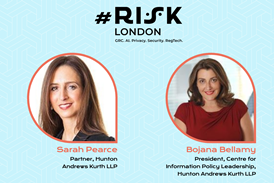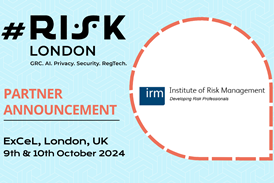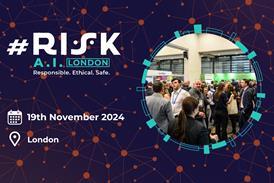All PrivSec Global On-Demand articles – Page 2
-
 Video
VideoU.S. Data Privacy laws launch a new era in 2023 [Sponsored by Trust Cassie]
California, followed by Colorado, Connecticut, Utah, and Virginia are enforcing new GDPR-inspired statutes in 2023. With the United States historically allowing businesses and institutions to collect personal information without express consent, this marks a significant shift in data protection history.
-
 Video
VideoThe UK Government renews its efforts to UK’s Data Protection [Sponsored by Zivver & OneTrust]
The UK is reforming its Data Protection regime with the Data Protection and Digital Information Bill (No. 2). The Bill does not comprise an extensive overhaul of the UK’s data protection laws, but rather a set of clarifications and adjustments to provide organisations with greater flexibility over the use of personal data.
-
 Video
VideoTransformative changes: 36 out of 54 African countries embrace Data Protection Law
African countries are continuing to strengthen data protection legal and regulatory frameworks. To date, 36 out of 54 African countries have data protection laws and/or regulations.
-
 Video
VideoEmbedding Privacy by Design to Enforce Responsible Use of Data [Sponsored by OneTrust]
In this session, we’ll discuss recent Privacy by Design guidelines and what this tangible guidance means for privacy programs looking to evolve to beyond compliance to enforce responsible use of data.
-
 Video
VideoWorkplace AI policies: Does your company need them? [Sponsored by Sypher]
This interactive session will provide a practical roadmap to avoid AI chaos, how to overcome challenges and pitfalls, and build a responsible AI strategy in the workplace.
-
 Video
VideoHuman-Centric Security Culture [Sponsored by ZIVVER]
Traditionally, building a security culture is based on strict industry certifications, policies, laws, and regulations. Security professionals are taught that employees in the organization are the most significant risks and to “manage those risks.” But what does it take to integrate human centricity into your security culture?
-
 Video
VideoZero Trust: Rethink security, and redefine resilience [Sponsored by C2RISK]
With the rise of remote and hybrid work, organisations have grappled to secure their digital ecosystems, providing cybercriminals with fresh grounds in unsecured home networks, personal devices, and weak authentication practices.
-
 Video
VideoThe ICO and the Regulatory Landscape: Fireside Chat with Emily Keaney, Deputy Commissioner of the ICO and Ana Fernandes, Principal Consultant at PA Consulting [Sponsored by PA Consulting]
This discussion will focus on the role of the ICO in the broader digital regulatory landscape, including changes presented in the upcoming Data Protection and Digital Information Bill.
-
 Video
VideoLike the GDPR but not the same: Asia’s Data Protection journey
Join us for an update on your jurisdiction Data Protection Law, and get a chance to have your questions answered.
-
 Video
VideoIndia introduces new Digital Personal Data Protection Bill [Sponsored by Exterro]
Highly relevant for India’s rich and vibrant community of privacy pros and highly relevant for the global privacy community whose organisations process data “in connection with any activity related to offering or goods or services” in India, the DPDP Bill, 2023, is the fifth iteration of India’s much-awaited data protection law, with previous versions released in 2018, 2019, 2021, and 2022.
-
 Video
VideoInternet Intelligence for Better Exposure Management and Threat Hunting
Today’s security teams’ task lists are becoming more and more complex. To deal with a rapidly-growing threat environment and increasingly sophisticated bad actors, security teams are managing multiple tools that don’t provide a needed outside-in perspective.
-
 Video
VideoFight Fire With Fire: Artificial Intelligence for Red Teams and Blue Teams
This session will explore how AI is changing the threat landscape—and how to leverage AI to defend your organisation.
-
 Video
VideoIs the GDPR’s ‘One-Stop-Shop’ Working?
One common criticism of the GDPR is that its enforcement process is not sufficiently effective. Critics argue that routing cross-border decisions through a controller’s “main establishment” has led to delays and created an enforcement gap.
-
 Video
VideoRansomware: Should You Ever Pay? Preparing for the Worst
Research suggests that most organisations hit with a ransomware attack end up paying the ransom. Perhaps this is understandable—but is it the right decision? And can paying a ransom to cybercriminals actually be illegal in some circumstances?
-
![Preventing Insider Threats Without Compromising Workflow [Sponsored by Zivver]](https://d6t93aut4ltrr.cloudfront.net/Pictures/100x67/1/1/6/20116_preventinginsiderthreatswithoutcompromisingworkflowsponsoredbyzivver_999564_crop.jpg) Video
VideoPreventing Insider Threats Without Compromising Workflow [Sponsored by Zivver]
Insider threats, whether through error or malicious action, still account for a large proportion of data breaches. But monitoring and trying to control the actions of your employees is fraught with issues.
-
 Video
VideoWhat Is ‘Necessary’ for a Contract? GDPR Legal Bases Following the Meta Decisions
The Irish Data Protection Commission (DPC)’s decisions against Facebook, Instagram and WhatsApp are some of the most significant developments in data protection since the passing of the GDPR.
-
![Staying Compliant- How To Manage Data Transfers Around The Globe [Sponsored by OneTrust]](https://d6t93aut4ltrr.cloudfront.net/Pictures/100x67/1/1/4/20114_stayingcomplianthowtomanagedatatransfersaroundtheglobesponsoredbyonetrust_701157_crop.jpg) Video
VideoStaying Compliant: How To Manage Data Transfers Around The Globe [Sponsored by OneTrust]
The topic of international data transfers has been a contentious subject since the Court of Justice of the European Union (CJEU) rules on the Schrems II case, invalidating the EU-US privacy shield and changing the way organisations manage persona data transfers overnight.
-
 Video
VideoGenerative AI and the GDPR: A Match Made in Hell?
Large Language Models (LLMs) and image generation are officially mainstream. With millions of people using AI tools every day, the internet and wider society are changing fast.
-
 Video
VideoPreparing for a privacy incident: last 90 days before it happens
There is no such thing as perfect compliance - privacy incidents can and will happen.
-
 Video
Video2023 vs 1984: Is State Surveillance Becoming More Intrusive?
New data protection and privacy laws are developing all over the world. Yet the amount of data collected about people by corporations and governments continues to increase. And new technology, such as biometrics, IoT, and AI, bring new surveillance opportunities.














